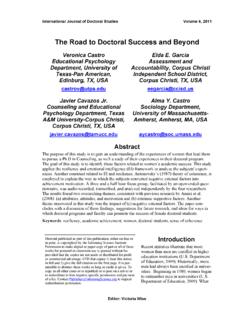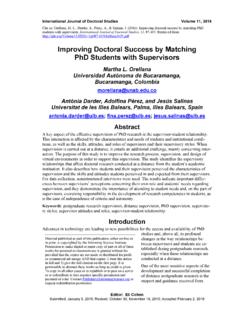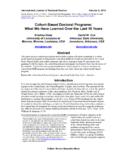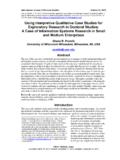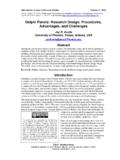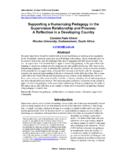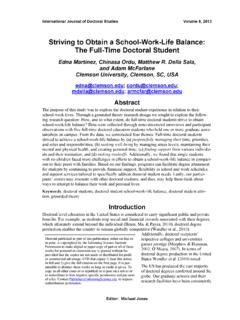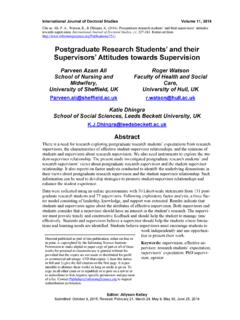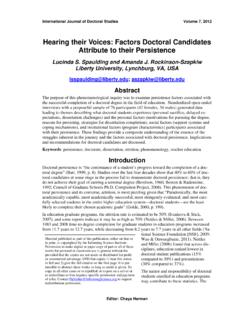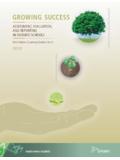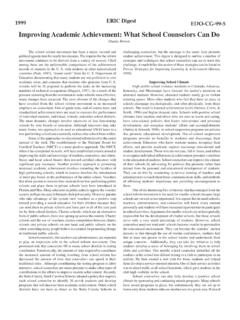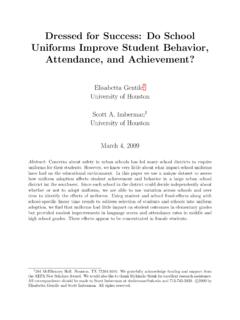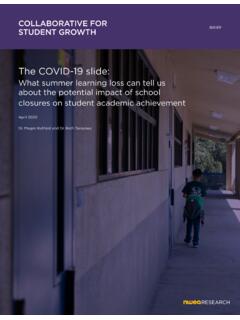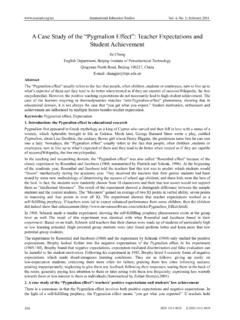Transcription of The PhD Experience: A Review of the Factors Influencing ...
1 Volume 13, 2018. THE PHD EXPERIENCE: A Review OF THE Factors . Influencing DOCTORAL STUDENTS' COMPLETION, ACHIEVEMENT, AND WELL-BEING. Anna Sverdlik* McGill University, Montreal, Quebec, Canada Nathan C. Hall McGill University, Montreal, Quebec, Canada Lynn McAlpine University of Oxford, Oxford, England Kyle Hubbard McGill University, Montreal, Quebec, Canada * Corresponding author ABSTRACT. Aim/Purpose Research on students in higher education contexts to date has focused primarily on the experiences undergraduates, largely overlooking topics relevant to doctoral students' mental, physiological, motivational, and social experiences. Existing re- search on doctoral students has consistently found mental and physical health con- cerns and high attrition rates among these students, but a comprehensive under- standing of these students' experiences is still lacking. Background The present Review paper aims to offer deep insight into the issues affecting doc- toral students by reviewing and critically analyzing recent literature on the doctoral experience.
2 An extensive Review of recent literature uncovered Factors that can be readily categorized as external and internal to the doctoral student; external Factors include supervision, personal/social lives, the department and socialization, and financial support opportunities, while internal Factors motivation, writing skills, self- regulatory strategies, and academic identity. Methodology 163 empirical articles on the topic of doctoral education are reviewed and analyzed in the present paper. Contribution The present paper represents a comprehensive Review of the Factors found to influ- ence the experiences ( , success , satisfaction, well-being) of doctoral students in their programs. It represents a unique contribution to the field of doctoral educa- tion as it attempt to bring together all the Factors found to date to shape the lived experiences of doctoral students, as well as evidence-based ways to facilitate stu- dents' success and well-being through these Factors .
3 More specifically, the present paper aims to inform students, faculty, and practitioners ( , student support staff). Accepted by Editor Simona Scarparo Received: November 6, 2017 Revised: May 13, June 11, 2018 . Accepted: September 3, 2018. Cite as: Sverdlik, A., Hall, N. C., McAlpine, L., & Hubbard, K. (2018). Journeys of a PhD student and unaccompa- nied minors. International Journal of Doctoral Studies, 13, 361-388. (CC BY-NC ) This article is licensed to you under a Creative Commons Attribution-NonCommercial International Li- cense. When you copy and redistribute this paper in full or in part, you need to provide proper attribution to it to ensure that others can later locate this work (and to ensure that others do not accuse you of plagiarism). You may (and we encourage you to). adapt, remix, transform, and build upon the material for any non-commercial purposes. This license does not permit you to use this material for commercial purposes.
4 The PhD Experience of the optimal practices and structures uncovered to date, as most beneficial to doctoral students in terms of both academic success and well-being. Impact on Society Decreases to doctoral students' well-being as they progress in their programs, fi- nancial struggles, and the notable difficulty in maintaining a social life/family re- sponsibilities have been widely discussed in popular culture. The present paper aims to highlight these, and other, issues affecting the doctoral experience in an attempt to contribute to the conversation with comprehensive empirical evidence. By facili- tating discussions on the issues that play a role in the attribution and dissatisfaction of existing doctoral students, and perhaps deter potential doctoral students from ever entering doctoral education system, we hope to contribute to a student- cantered focus in which departments are concerned with the academic success of doctoral students, but also equally concerned with maximizing students' well-being in the process of attaining a doctoral degree.
5 This, we hope, will enhance the socie- tal perception of doctoral education as a challenging, yet worthwhile and rewarding process. Future Research Future research in which the confluence of the Factors discussed in this Review , particularly with respect to the cross-cutting impact of socialization variables, is recommended to provide a sufficiently in-depth examination of the salient predic- tors of doctoral student development and persistence. Future research efforts that steer away from single-factor foci to explore interactive or redundant relationships between Factors are thus recommended, as are analyses of the potential effects that changes to one aspect of the doctoral experience ( , motivational interventions). can have on other Factors . Finally, studies employing various alternative methodologies and analytical methods ( , observational, questionnaire, experimental, experience sampling) are similarly expected to yield valuable knowledge as to the nature and extent of the afore- mentioned and novel contributing Factors , as well as the utility of student interven- tion programs aimed at improving both the personal and professional lives of doc- toral students internationally Keywords doctoral education; doctoral well-being; higher education; graduate education; doc- toral achievement INTRODUCTION.
6 Research on students in higher education contexts to date has focused primarily on the motivation, achievement, and well-being of undergraduates, largely overlooking topics relevant to doctoral students'. mental, physiological, motivational, and social experiences (Brus, 2006; Longfield, Romas, & Irwin, 2006;. Pocock, Elton, Green, McMahon, & Pritchard, 2011). In Canada and the United States, there has been a 57% and 64% increase in doctoral enrollment between 1998 and 2010 respectively (OECD, 2013), with women and visible minorities becoming increasingly represented across disciplines (Council of Graduate Schools, 2012; National Science Foundation, 2012; Statistics Canada, 2011). However, attrition from doc- toral programs has remained consistently high in North American institutions over the past 50 years, with approximately 50% of students dropping out (Lovitts, 2001; MELS, 2012) even while holding prestigious fellowships (Wendler et al.)
7 , 2012). To better understand the issue of attrition in doctoral education, re- search has predominantly focused on seven categories of the doctoral experience: completion and attri- tion rates, time to degree, socialization processes, dissertation logistics, supervisory roles and relation- ships, gender and race, and disciplinary differences (Gardner, 2009). As such, whereas most empirical efforts have been directed toward understanding the developmental and structural elements affecting the doctoral experience, issues affecting students' personal lives and well-being have been relatively over- looked. 362. Sverdlik, Hall, McAlpine, Hubbard Existing research on doctoral students' well-being has consistently found high-stress levels (Kernan, Bo- gart, & Wheat, 2011; Virtanen, Taina, & Pyh lt , 2016; Wyatt & Oswalt, 2013), mental-health concerns ( , depression; Hyun, Quinn, Madon, & Lustig, 2006; Pallos, Yamada, & Okawa, 2005), and alarming physical health symptoms ( , upper respiratory infections; Juniper, Walsh, Richardson, & Morley, 2012.
8 Kernan et al., 2011; Pallos et al., 2005) to be reported by students. Moreover, studies that aim to explore the positive emotions associated with the doctoral experience unfortunately tend to report negative emo- tions as the dominant affective state for PhD students (Hughes, 2011). In terms of their social and per- sonal lives, doctoral students also tend to report difficulties with maintaining relationships (Dabney &. Tai, 2013; Wellington & Sikes, 2007) and engaging in social activities (Juniper et al., 2012; Longfield et al., 2006) due to a lack of time, financial resources, and motivation. For many, the added demands of family responsibilities during one's doctoral studies have also been found to negatively impact quality of life and well-being (Pocock et al., 2011; Skinner, 2009). These threats to psychological and physical well-being in doctoral studies can, in turn, negatively affect students' academic motivation and interfere with their at- tainment of long- and short-term goals (Geraniou, 2010; Tanaka & Watanabea, 2012).
9 Consequently, a comprehensive understanding of the doctoral experience focusing on students' physical, psychological, and emotional well-being is warranted to provide a well-rounded perspective on the challenges faced in graduate education. Review PARAMETERS. This Review paper aims to offer deeper insight into the issues articulated above by reviewing and critically analyzing recent literature on the doctoral experience. Of particular importance is understanding the var- ious Factors that influence doctoral students' experiences, with the present Review drawing on recent con- ceptual and empirical literature in the field of doctoral education to examine common challenges in doc- toral programs. Moreover, whereas the roles of demographic and structural Factors such as enrollment status, discipline, gender, and race will inevitably impact the doctoral experience (see Castello et al., 2017;. Ellis, 2001), the present Review instead focused on literature examining psychological and social Factors such as socialization, motivation, and personal/social lives that have not been synthesized together in a published Review to date.
10 The articles in the present Review were retrieved from four databases ERIC, PsychINFO, Scopus, and Web of Science and at least one of the following four keywords needed to appear in an article's title or abstract: doctoral students, PhD students, postgraduate students, or graduate students. The search was then narrowed by combining the initial set of keywords with a second set of keywords (using the Boolean operator AND): experience, well-being, achievement, and completion (Table 1). Table 1. Summary of search strategies and included literature ORIGINAL AR- RETRIEVED. DATABASE SEARCH TERMS TICLES. ARTICLES. INCLUDED. ERIC Doctoral students OR PhD students OR postgraduate stu- 378 72. dents OR graduate students AND (experience OR well-being OR achievement OR completion). PsychINFO Doctoral students OR PhD students OR postgraduate stu- 229 44. dents OR graduate students AND (experience OR well-being OR achievement OR completion).
